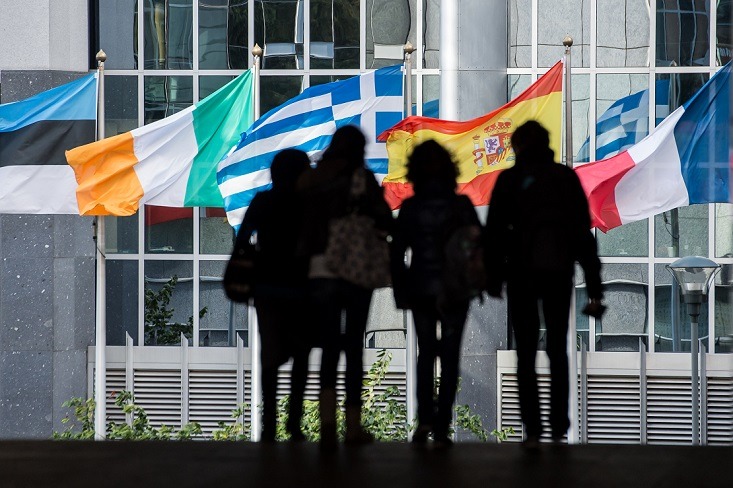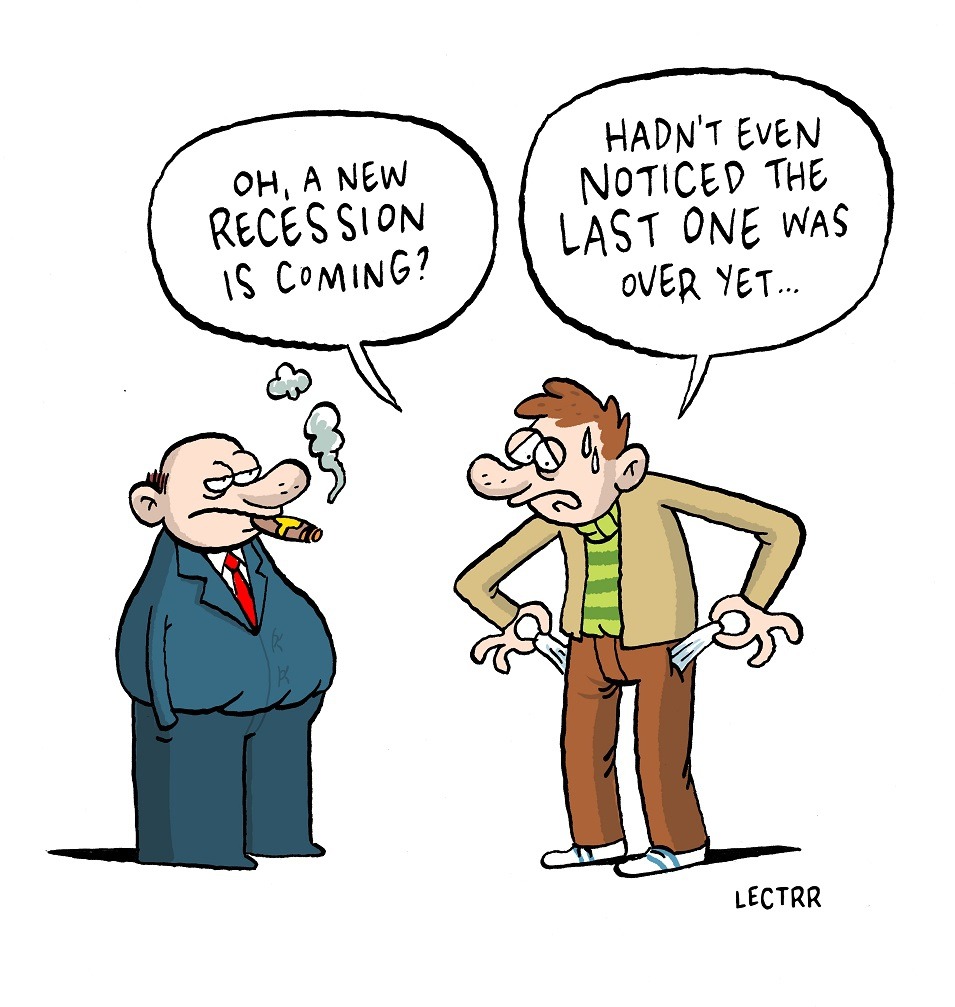Is the eurozone heading for recession? How will policymakers react if the slowdown does get worse? And what damage could an economic downturn do to Europe’s already fractious politics?
Those pressing questions ought to be at the top of policymakers’ minds in the run-up to the European Parliament elections in May.
As we slowly leave the cold season behind us, a wintry chill has suddenly descended on the eurozone economy. Looming storm clouds threaten further disruption. And just as the authorities struggle to get Brussels moving again when a snowstorm hits, eurozone policymakers are ill-equipped to stimulate the economy if it stalls. Indeed, there is a big danger they would actually make matters worse.
Worrying signals
The warning signals are already flashing orange. After a surprisingly strong 2017, the economy weakened substantially last year. When growth almost ground to a halt in the third quarter – and major economies such as Germany and Italy actually shrank – many thought it was just a blip. But the news since then has been ominous. Exports have flagged. Industrial production is falling. Business confidence is down. The blip now looks like a downturn – and if businesses cut back their investment and consumers their spending, it could readily become a recession.
The global context is gloomy. Most of the world economy is weakening. Rising US interest rates and a stronger dollar are weighing on the American economy, as well as on many emerging economies. China’s economy is slowing too. And since the eurozone is unhealthily reliant on exports to grow, all that is harming growth elsewhere harms Europe too.
Global politics is also prickly. The threat of a trade war with the US remains very real. Despite the truce that European Commission President Jean-Claude Juncker struck with Donald Trump last July, the US president is itching to impose punitive tariffs on imports of European cars. Nor can a chaotic no-deal Brexit be ruled out. That would be calamitous for Britain and painful for many eurozone exporters too.
So, unless domestic demand in the eurozone proves resilient – or receives a timely boost from policymakers – a deteriorating external environment could easily tip the economy into recession. According to Absolute Strategy Research, an economic research consultancy, the risk of a recession in the first half of this year is as high as 63%.
Not again! – many Europeans will think. For many people, it feels like the eurozone has only just emerged from the previous downturn. While official statistics suggest the recovery began in 2013, the hangover from the 2012 recession lasted until much later. Because of excessive austerity and wage cuts, many people didn’t feel the benefits of higher living standards until recently. Even now, far too many people are still unemployed, notably in southern Europe. Many more feel insecure about their economic prospects.
Disruptive elections ahead
That’s one big reason why support for the two biggest political groups in the European Parliament – the conservative European People’s Party (EPP) and the centre-left Socialists & Democrats (S&D) – has plunged. Polls suggest that the dominant duo that have previously run the Parliament through a quasi-permanent grand coalition are set to lose their majority for the first time.
On the plus side, cracking open their incestuous cartel could provide a breath of fresh air. The beneficiaries of this political shake-up could include enthusiastically pro-EU Greens. They are unabashedly in favour of Europe’s open societies – and rightly critical of the corrupt corporatists who have coddled failed banks and car companies that lied and cheated about diesel vehicles’ poisonous emissions.

According to Absolute Strategy Research, an economic research consultancy, the risk of a recession across the eurozone in the first half of this year is as high as 63%.
Liberal pro-EU reformers may also benefit. Although President Emmanuel Macron is now seen by many French voters as an out-of-touch establishment insider, La République en Marche and other social liberal parties seem set to bolster the Alliance of Liberals and Democrats for Europe (ALDE).
But there is also a dark side to this disruption. A nasty mix of noxious nationalists is set to gain ground, with record numbers of far-right MEPs returned. Putin-loving, immigrant-hating, anti-EU, reactionary and authoritarian, they range from Lega in Italy to the Rassemblement National in France, the AfD in Germany, the Sweden Democrats and Viktor Orban’s Fidesz in Hungary – which the EPP shamefully still welcomes in its group.
While the populist nationalists’ rallying cries are xenophobic and reactionary, their core support is bolstered by voters who feel marginalised, ignored and economically insecure. So there is a political imperative as well as an economic one for eurozone policymakers to limit unnecessary economic pain. They need to do their best to keep the economy growing and respond promptly to any recession. They need to be seen to act fairly and to ensure the most vulnerable aren’t harmed. Above all, they need to avoid making matters worse. Surely they have learned their lessons from the unnecessary misery they imposed during the depths of the 2010-13 crisis?
What can be done to stabilize the European economy?
One constructive response to a downturn would be monetary stimulus. But with official interest rates near-zero (or slightly negative even), there is little scope to loosen them.
The European Central Bank’s decision to stop buying eurozone government bonds at the end of last year now looks poorly timed. The official objective of its quantitative easing (QE) programme – to get inflation back up to its target of nearly 2% – has not been achieved. And insofar as QE lowered long-term interest rates and thus supported investment, consumption and growth, ending it just when the economy is slowing is unfortunate. Worse, the ECB will be reluctant to lose face by reversing course quickly, so it is unlikely to restart QE this year even if it ought to.
A second option would be fiscal stimulus. On the plus side, the tax cuts and spending splurges that both France and Italy are embarking on this year for political reasons now look well-timed economically. And with Germany’s export-driven economy at the sharp end of the global downturn and potential American protectionism, there is talk of loosening the purse strings even in fiscally austere Berlin.
Fingers crossed. But more broadly, the eurozone’s fiscal straightjacket – the stupidly rigid and absurdly complex rules of the Stability and Growth Pact and the Fiscal Compact – make an appropriate stimulus tricky.
For sure, the European Commission has some leeway in how it interprets the fiscal rules. It has been more flexible recently than it was during the 2010-13 crisis. But if the slowdown depresses tax revenues and boosts social spending, raising public borrowing, the likelihood is that the Commission would insist on counterproductive budget cuts. Nor, regrettably, is there a eurozone-wide fiscal authority that could step in to stabilise the economy.
The bigger danger is that the financial crisis could be reignited in some form. Even a more contained crisis could lead to competitive wage cuts, counterproductive austerity and costlier government borrowing. That would exacerbate the anti-establishment political backlash.
Since many Europeans are already angry at politicians and gloomy about the future, bleaker economic times and further policy punishment will make matters worse.
In my book European Spring, I set out a blueprint for how to get out of the mess we are in. Here’s one big idea: a Green New Deal. With funding from the European Investment Bank (EIB), this would involve big investments in energy efficiency and climate-friendly infrastructure, increased investment in research and development (R&D) in clean technologies and tax and regulatory changes that would give businesses an incentive to commercialise them.
A Green New Deal would give the economy a timely boost, foster the businesses and jobs of the future and help the EU achieve its climate-change objectives. That is something even the gilets jaunes, who protest in their yellow vests about the cost of fuel taxes and much else, might cheer.
By Philippe Legrain


